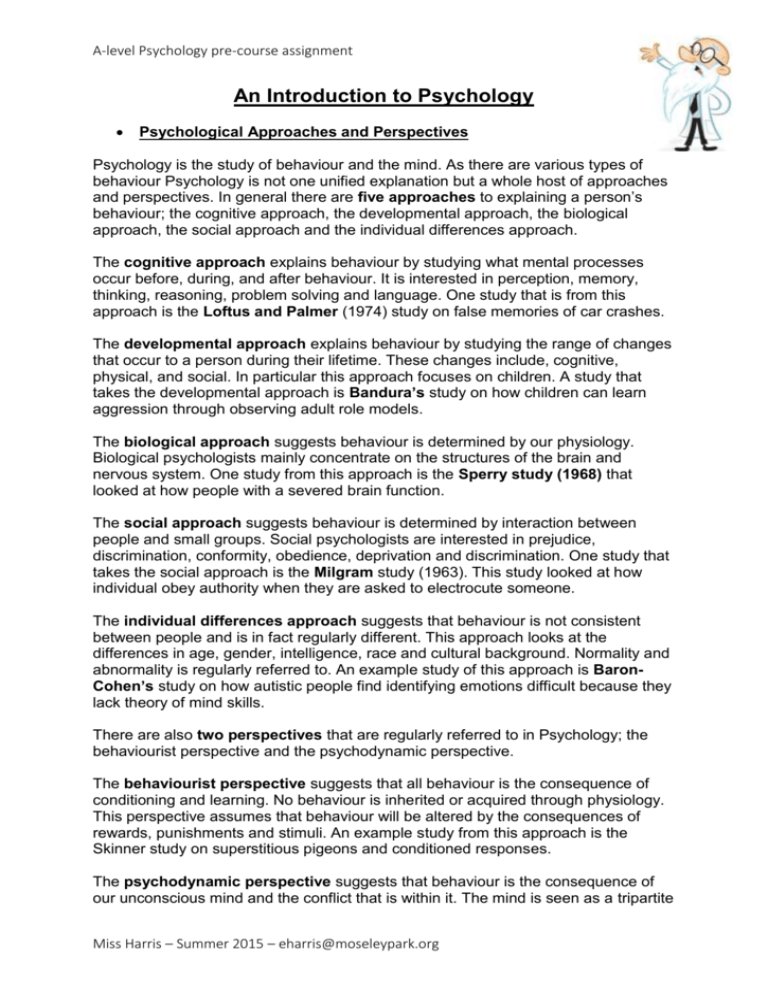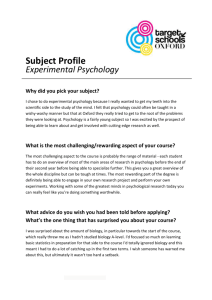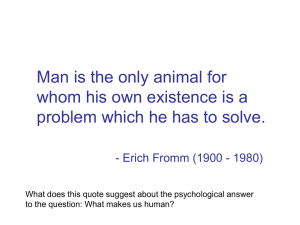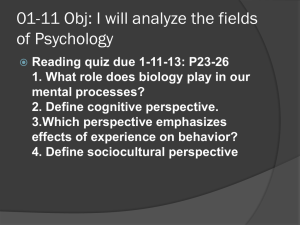Psychology Pre-Course Task
advertisement

A-level Psychology pre-course assignment An Introduction to Psychology Psychological Approaches and Perspectives Psychology is the study of behaviour and the mind. As there are various types of behaviour Psychology is not one unified explanation but a whole host of approaches and perspectives. In general there are five approaches to explaining a person’s behaviour; the cognitive approach, the developmental approach, the biological approach, the social approach and the individual differences approach. The cognitive approach explains behaviour by studying what mental processes occur before, during, and after behaviour. It is interested in perception, memory, thinking, reasoning, problem solving and language. One study that is from this approach is the Loftus and Palmer (1974) study on false memories of car crashes. The developmental approach explains behaviour by studying the range of changes that occur to a person during their lifetime. These changes include, cognitive, physical, and social. In particular this approach focuses on children. A study that takes the developmental approach is Bandura’s study on how children can learn aggression through observing adult role models. The biological approach suggests behaviour is determined by our physiology. Biological psychologists mainly concentrate on the structures of the brain and nervous system. One study from this approach is the Sperry study (1968) that looked at how people with a severed brain function. The social approach suggests behaviour is determined by interaction between people and small groups. Social psychologists are interested in prejudice, discrimination, conformity, obedience, deprivation and discrimination. One study that takes the social approach is the Milgram study (1963). This study looked at how individual obey authority when they are asked to electrocute someone. The individual differences approach suggests that behaviour is not consistent between people and is in fact regularly different. This approach looks at the differences in age, gender, intelligence, race and cultural background. Normality and abnormality is regularly referred to. An example study of this approach is BaronCohen’s study on how autistic people find identifying emotions difficult because they lack theory of mind skills. There are also two perspectives that are regularly referred to in Psychology; the behaviourist perspective and the psychodynamic perspective. The behaviourist perspective suggests that all behaviour is the consequence of conditioning and learning. No behaviour is inherited or acquired through physiology. This perspective assumes that behaviour will be altered by the consequences of rewards, punishments and stimuli. An example study from this approach is the Skinner study on superstitious pigeons and conditioned responses. The psychodynamic perspective suggests that behaviour is the consequence of our unconscious mind and the conflict that is within it. The mind is seen as a tripartite Miss Harris – Summer 2015 – eharris@moseleypark.org A-level Psychology pre-course assignment entity that has an Id (desire), Ego (reality) and Superego (Morality). Individuals will suffer mental illness if there is an imbalance between the three sub parts of the unconscious mind. This perspective is primarily concerned with mental health and the way individuals deal with crises. An example study is Freud’s study of Little Hans. Psychological Methods As well as the seven approaches and perspectives Psychology relies on five key methods of conducting research. These are experiments, observations, selfreports, case studies and the data analysis technique of correlation. The experimental method is scientific as it controls variables and tries to find a cause and effect relationship between two things. This is achieved by manipulating one variable, recording the result of another variable and standardising other variables that may alter the results. Experiments look for cause and effect relationships. There are three distinct types of Experiment. The first is called laboratory experiment as it is conducted in an artificial room where as many variables are standardised. The second is called a field experiment and is conducted in a more realistic setting but with less control of variables. The final experiment is called a quasi or natural experiment where the manipulated variable has natural differences. The observation method is also scientific as it records observable behaviour. It is different to an experiment though as observations do not have a variable they wish to manipulate and record the consequences. Observations can be overt and covert, participant and non-participant, direct and indirect. There are two general sub groups of observation. These are controlled observations and naturalistic observations. A controlled observation controls some aspect of the situation and is not in an entire realistic environment. Naturalistic observations are conducted in natural settings that are not controlled by the investigator. The self-report method records people’s opinions and perceptions on their behaviour. It is the method of asking questions. There are three main types of self-report measures. They are questionnaires, psychometric tests and interviews. A questionnaire is selection of written questions that people are asked to give their opinions on. An example study that uses a questionnaire is Loftus and Palmer’s study on false memories and car crashes. Psychometric tests are similar to a questionnaire but also measure a person’s ability in something. An example is an IQ test. Interviews are questionnaires that are conducted face to face like a conversation. The case study method is a long term study of behaviour or opinions using one or more of the methods described above. It is used to determine changes of behaviour over time. Miss Harris – Summer 2015 – eharris@moseleypark.org A-level Psychology pre-course assignment The data analysis method of correlation does not suggest cause and effect relationships. Instead it states relationships between things that can be caused by one variable or another variable. Psychological Evaluation At every level of Psychology, research and theories are evaluated rigorously. Findings and conclusions about how people behaved must be based on evidence that is true and not flawed in some way. At AS level the evaluation of psychological studies can be remembered by the mnemonic PERVED. Practicalities - this means how well designed the study is. This includes: Were participants confused by the instructions? Has the experimenter made it biased so something is more likely to happen? Is the study carried out in exactly the same way for each participant? Ethics – this means does the study protect the participants? This includes: Informed consent No deception during the study’s activities Protected from physical and mental harm Participants’ identities are kept confidential The right to withdraw from the study at any time Reliability – this means the results of the study would be the same if the study was repeated exactly in the way it was done before. It is often referred to as consistency of measurement. This includes: Is anything that changes which is not being investigated controlled so it is the same all the time? Do all the experimenters record the same results when they record at the same time? Validity – this means the study objectively measures the behaviour that it aims to measure. This includes: Is the measurement scientific? Does it explain why as well as what happened in the study? Does it check the results against other similar studies’ results? Ecological Validity – this means how realistic the study is. This includes: How realistic the situation is How realistic the task is Does the sample include a cross section of the population? Data collected – this means what information was collected. It can be qualitative or quantitative. All studies should have both. Miss Harris – Summer 2015 – eharris@moseleypark.org A-level Psychology pre-course assignment Psychological Debates Throughout psychology there are a number of big questions that form the basis of the reasons why research is conducted. These have become the over reaching debates that different research studies have been used as evidence for one argument or another. In their simplest form they are bipolar arguments with two opposing points of view at each end of the spectrum, however these debates are often multifaceted and difficult to pick apart. The main debates in psychology are: is psychology a science, the usefulness of psychological research, free will vs. determinism, nature vs. nurture, individualism vs. situationalism, reductionism and holism. The debate whether psychology is a science stems from the various approaches that psychologists use to measure behaviour. On the one hand psychologists want to create evidence and facts about behaviour whilst on the other hand they want to describe the processes and opinions on behaviour. For psychology to be scientific it must be objective and not subjective, have method, and a means of testing if something is false. The usefulness of psychology is concerned about whether psychological knowledge is useful to the real world. If all psychological research is confined to artificial sterile environments then the knowledge of behaviour may not be useful as behaviour in the real world does not occur in a vacuum. Free will is the suggestion that people can choose how they think and behave. Determinism suggests that the way you behave is due to different things that have occurred before. Psychologists are often concerned about the implications of their research in this debate as free will suggests that people are answerable for their actions whilst determinism suggests that they cannot stop or control them and should not be held accountable Nature suggests that the causes of behaviour are determined by our physiology and is inherited. Nurture suggests that our behaviour is learned and therefore we are all initially a blank slate. Psychologists are often concerned about the implications of suggesting that behaviour is caused by one or the other. Individualism suggests that a person has something called personality or that they behave consistently over time and situations. Situationalism suggests that individuals will act differently depending on the time and place they are. Reductionism suggests that behaviour can be described in simple terms and basic ideas. Holism suggests that behaviour is incredibly complex and must be seen in all its variations. Behaviour cannot therefore be described or recorded in only one way. Miss Harris – Summer 2015 – eharris@moseleypark.org A-level Psychology pre-course assignment Your task Research is a crucial part of Psychology. This task will help you to get to grips with the basics. All experiments need an independent variable and a dependant variable. Find definitions of these: Independent variable: Dependant variable: You are going to carry out a simple experiment to help you understand more about Psychology and to prepare you for your A-level course. Select one of the following topics: Do males forget more than females? Are the stereotypes true? Do males remember facts, such as football scores, better than females? Do females remember emotional events better than males? Is it easier to remember items that are organised or mixed up? Does visualising items from a shopping list help in recalling them later? Do people have a better memory for material presented as pictures rather than words? Would it be better to learn lines for a play by repeating them or writing them out? A replication of the Stroop effect. The Mozart effect. Does listening to classical music improve concentration? Face recognition. Is it easier to recognise the top half or the bottom half of a celebrity face? Before any piece of experimental research can be done you need a hypothesis. This is a testable, predictive statement. Read and complete the hypothesis sheet at the back of this booklet to see how to write different types of hypotheses. Then write a two-tailed hypothesis for your study in the space below: My hypothesis Miss Harris – Summer 2015 – eharris@moseleypark.org A-level Psychology pre-course assignment There are three types of experimental design. Research and define them: Independent measures design: Repeated measures design: Matched pairs design: Choose one of these experimental designs to use in your study. State which one you are using and why you have picked it. Can you think of any strengths or weaknesses of organising the participants in your study in this way? Miss Harris – Summer 2015 – eharris@moseleypark.org A-level Psychology pre-course assignment Ethics These are very important in Psychology – particularly as our subject matter is people and we need to make sure they are not harmed by our investigations. Research some of the main ethical guidelines in Psychology and write about them below. Can you give examples to help explain your points? Miss Harris – Summer 2015 – eharris@moseleypark.org A-level Psychology pre-course assignment Designing your study You can now start to plan your study. Detail is very important here. I should be able to take your plan and carry out your study EXACTLY without having to ask you for any more information about what I need to do. Give specifics such as examples of questions or tasks and make sure you answer the following: Who will take part in your study – where will you get them from? What is the task they have to do? Where will they do it? When will they do it? How will they do it? Miss Harris – Summer 2015 – eharris@moseleypark.org A-level Psychology pre-course assignment Now carry out your study – make sure you record the results carefully! Miss Harris – Summer 2015 – eharris@moseleypark.org A-level Psychology pre-course assignment Results You need to display the results of your study in a way that is useful and easy to understand. Produce a suitable graph of your data: There are three types of data we use in Psychology. Write definitions of each type: Nominal data: Ordinal data: Interval data: Which sort of data do you have in your study? Miss Harris – Summer 2015 – eharris@moseleypark.org A-level Psychology pre-course assignment Inferential statistics Level of data Difference Correlation Independent measures design Repeated measures design Nominal Chi-square (Binomial sign test) Ordinal Mann-Whitney U test Wilcoxon signed-rank test Spearman's rho correlation coefficient Which test should you use with your data? Inferential statistics help us to decide whether what we have found in our research is something genuine (significant) or whether it has just occurred by chance. The results from our inferential tests help us to decide how confident we can be that our research is significant. During Yr12 you will learn how to do these statistical tests and how to look up the number you get on a significance table. This gives the ‘p’ or probability value. The p-value tells us how likely it is the research from our results occurred by chance. In Psychology we want a p-value of 0.05 or lower. This means the probability of our results being just down to chance is only 5% - so we can be 95% confident that we have found something genuine – which is pretty good odds! Miss Harris – Summer 2015 – eharris@moseleypark.org A-level Psychology pre-course assignment Conclusions Once you have your results you need to draw some conclusions about what you have discovered. Outline what you found Miss Harris – Summer 2015 – eharris@moseleypark.org A-level Psychology pre-course assignment Evaluation All good psychologists evaluate their work to help them improve. Think about what went well and what may have been a weakness. Remember it is very difficult to design a perfect piece of psychological research, so there are probably plenty of ways you could criticise it. Look back to the information at the start of this booklet to help you. Strengths of my study (make sure you say why!) Weaknesses of my study (make sure you say why!) Miss Harris – Summer 2015 – eharris@moseleypark.org A-level Psychology pre-course assignment Aims and Hypotheses Aims An aim is a reasonably precise statement of why a study is taking place e.g. to investigate the effect of alcohol on reaction time. It should include what is being studied and what the study is trying to achieve. Hypothesis A hypothesis is much more precise and predicts what is expected to happen e.g. alcohol consumption will significantly affect reaction times. Hypotheses are testable statements. There are two types. Experimental Hypothesis These predict significant differences in the DV as a result of manipulation of the IV. They predict that any differences will not be due to chance. E.g. there will be a significant difference in reaction time as a result of alcohol consumption. The term experimental hypothesis should only be used with the experimental method. For all other methods alternative hypothesis should be used. Null Hypothesis This is the hypothesis of no differences. It predicts that the IV will not affect the DV. It predicts that results will simply be due to chance e.g. there will be no significant difference in reaction time as a result of alcohol consumption. After the study has been completed one of the above two hypotheses must be accepted and one rejected. Miss Harris – Summer 2015 – eharris@moseleypark.org A-level Psychology pre-course assignment One Tailed These state the direction in which the results are to go. E.g. there will be a significant increase in reaction time measured in seconds as a result of alcohol consumption measured by units consumed. They are called one tailed because they state the direction in which the results can go. Two Tailed These state that there will be a difference but don’t state the direction of the results e.g. there will be a significant difference in reaction times measured in seconds as a result of alcohol consumption. In this example reaction times could either increase or decrease and so they’re called two tailed. When to choose a one tailed hypothesis Traditionally you choose a one tailed hypothesis when you have good reason to be able to predict the direction of your result. For example if you are repeating previous experiments which have consistently produced results in the same direction. EXAMPLE Lack of sleep affects reaction time The faster you drive the more likely you are to crash Bald men look older than men of the same age with lots of hair Girls talk more than boys Miss Harris – Summer 2015 – eharris@moseleypark.org ONE or TWO TAILED? A-level Psychology pre-course assignment High temperatures make tomatoes grow quickly High temperatures affect the amount of work done People who sit next to each other in class at the beginning of the year are likely to become friends The quality of service in a restaurant affects its popularity Age affects short term memory The price of rail tickets affects the number of passengers on the train Now re-write the hypotheses above so that those that were one tailed are two tailed and vice versa. EXAMPLE REWRITE THE HYPOTHESIS Lack of sleep affects reaction time The faster you drive the more likely you are to crash Bald men look older than men of the same age with lots of hair Girls talk more than boys High temperatures make tomatoes grow quickly Miss Harris – Summer 2015 – eharris@moseleypark.org A-level Psychology pre-course assignment High temperatures affect the amount of work done People who sit next to each other in class at the beginning of the year are likely to become friends The quality of service in a restaurant affects its popularity Age affects short term memory The price of rail tickets affects the number of passengers on the train Miss Harris – Summer 2015 – eharris@moseleypark.org





